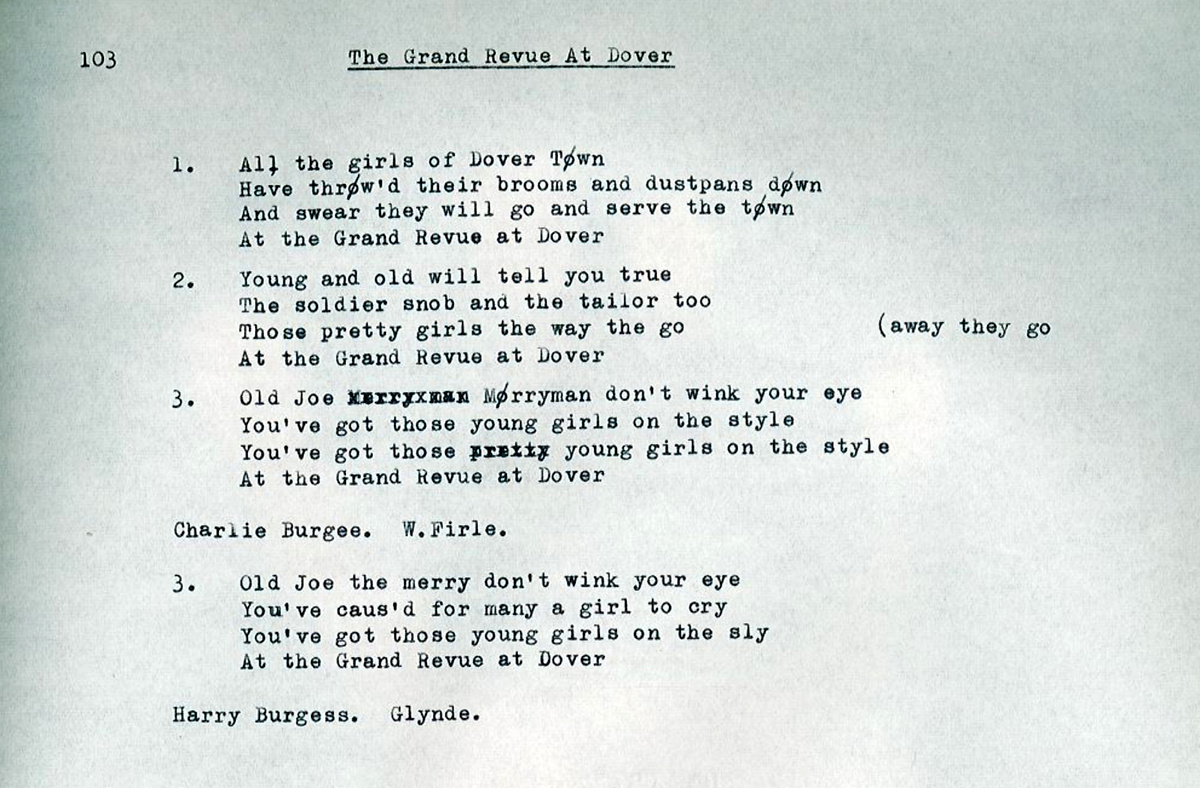The Volunteer Revue in Dover [I Would Rather Walk With You Process Blog #1]
What happens when you ask people to reimagine a melody lost in time?
Summary: When lockdown happened, I had to create parts of my new artwork—I Would Rather Walk With You—online. Previously, I planned to work with the local community in workshops to imagine and recreate sounds that might have been heard at Fort Burgoyne throughout its history. These sounds would feature in the final work. Instead, I taught local people how to create and record high quality sound effects on their mobile telephone during lockdown. Over 430 recordings were submitted, and I will create blogs about them in the coming months. The first explores what happened when people were asked to recreate a melody for a Victorian song—The Grand Revue in Dover—whose melody is lost in time. They came up with these fantastic responses which demonstrate creativity is still alive during this difficult time.
Full story:
I Would Rather Walk With You is a musical composition and sound installation that will be installed in the West Wing Battery at Fort Burgoyne in 2021. The work will emit from gun loops [windows] on the Battery’s exterior and interior walls. I Would Rather Walk With You comprises a choral work, intimate narratives from people once stationed at the site, and a soundscape capturing how it might have sounded throughout history.

When I first visited the Battery, I wanted to remember its history through sound and music. It is a beautiful and still place. While it wasn’t heavily used for its original purpose as a defence fort, it has seen action at certain points in history. Its soundscape would likely have included the Royal Garrison Artillery men; they trained many local Volunteers who enrolled to help look after the fort when funds were low. David Moore—author of Fort Burgoyne: A Dover Land Front Fort—reports that ‘on Easter Monday in April 1876 A Volunteer Review—a popular spectacle in Victorian England—took place in Dover’ (Moore, 2017, p. 30). The Volunteer Review involved 3000 men creating a mock battle to demonstrate how they would defend the fort if attacked. According to Moore (ibid., p. 31), the Volunteers and Artillery men were under the command of Colonel Court and ‘did their work with an efficiency which could hardly have been exceeded by regular troops’. Volunteers took pride in showing off their skills, and working together to defend Dover. It was an exciting scene with locals gathered in their hundreds to watch. It is unclear how many Volunteer Reviews took place, but we know one occurred on the same day in 1877.
I wanted I Would Rather Walk With You to reference the Volunteer Review and transport visitors back in time. I researched folk song archives to see if any songs were written about this spectacle at the time. The most comprehensive is Vaughan Williams Memorial Library, an online multi-media collection of folk songs and dances in the UK. If a folk song was written about The Volunteer Review, I hoped it would be found here. The songs in the library were collected during the British Folksong Revival by folksong collectors such as Cecil Sharp, Lucy Broadwood and Ralph Vaughan Williams himself. There were two revivals, the first circa. 1890-1914 and the second circa. 1945-70. Collectors would often take recordings of songs (the earliest on phonograph cylinders), notate lyrics or create sheet music, to preserve what was a vanishing tradition and to save local songs from being lost forever. Much of the traditional British folk music performed today is documented in these archives.
There are many well-known songs about Dover—e.g. White Cliffs of Dover (Walter Kent, 1941)—but only a few folk songs and lyrics found in the archive reference Dover itself. The most interesting song I found was collected by Mervyn Plunkett circa. 1957-1960. Titled The Grand Revue At Dover, it was collected in Glynde, Sussex. Plunkett typed these lyrics after witnessing a performance of the song by Charlie and Harry Burgess. There is no record of how the song sounded, and further research yields nothing about how the song sounded or its performers.

On first glance, The Grand Revue At Dover could easily refer to a theatrical revue. However, I believe it’s content could also relate to the Volunteer Review at Dover. Folk songs are passed along orally from person to person and performer to performer over a considerable period of time. The way they are shared evolves into a game of Chinese whispers, where lyrics are tweaked, misheard or reinterpreted by each person or performer. It is impossible to know who wrote many of the folk songs we know and love today, and the folk archive often has numerous versions of the same song with slight variations according to the geographical location they were collected in, who performed the song, and who collected it. Over time, folk songs adapt to reflect social and historical contexts. The Grand Revue At Dover does not exist in a fixed moment of time, and very likely changed over time. ‘Revue’ is a Victorian term, referring to the Theatrical Revue—a multi-act form of entertainment that developed in the late 1800s. I researched theatrical reviews in Dover that were prominent enough to have a song written about them that spread as far as Sussex and came up short: there is nothing. But we know that the Volunteers at Fort Burgoyne and The Volunteer Revue were once an important feature Dover that could have been captured in a song. It’s impossible to know for sure, but there is a possibility that The Grand Revue at Dover was created to capture the excitement of The Volunteer Review and evolved over time to reflect the popularisation of theatrical reviews. If it was created in the 1800s, this would explain why there is only one record of the song’s existence and why it travelled as far as Sussex. If it was created more recently—at the time of the theatrical Revue—records of the song would exist elsewhere. It was captured circa. 1957-1960, 70+ years after its possible creation. It is a song whose melody is now lost forever.
I decided to edit and reimagine the lyrics to reference its possible origin, and asked local people: The melody for this song is lost in time. Can you make one up?
The Volunteer Review at Dover (All the girls of Dover Town)
All the men at Dover Town
Have thrown their tools and work clothes down
To swear to go and serve the town
At the Volunteer Revue in Dover
All the girls of Dover Town
Have thrown their brooms and dustpans down
To swear to go and cheer the town
At the Volunteer Revue in Dover
Young and old will tell you true
The soldier, snob, and the tailor too
Fort Burgoyne is the way to go
At the Volunteer Revue in Dover
Watch the Volunteers parade
See the sortie and the raid
The skill of three thousand men displayed
At the Volunteer Revue in Dover
Pre-COVID, this song was to be explored in community and school workshops. However, when lockdown occurred my plans were scuppered. I devised a method of teaching people how to record high quality sound effects at home on mobile telephones and placed an open call to recruit local people. Over one hundred people registered to take part, and 430 recordings were received. 9 people recreated The Grand Revue At Dover (now The Volunteer Revue at Dover), and this is what they came up with. Cool, huh?
The Land Trust aim to establish the West Wing Battery as a community space for all to access, enjoy, relax and play in, a theme that is explored in I Would Rather Walk With You.
I Would Rather Walk With You is commissioned for Pioneering Places East Kent, delivered by The Land Trust at Fort Burgoyne, with the assistance of Dover Arts Development [DAD]. It is funded by National Lottery Heritage Fund, Arts Council England, Kent County Council, Canterbury Christ Church University and Historic England.




Leave a Reply